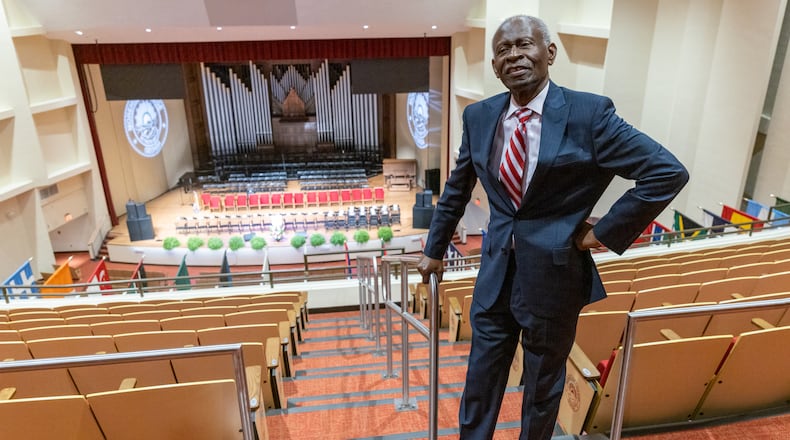“Oh my God. I never imagined that Black people could own a building like this.” - Benjamin E. Mays
In 1978, Morehouse College’s legendary former president Benjamin E. Mays was invited back to campus by his successor Hugh Gloster to take a tour of what was then called the Martin Luther King Jr. Memorial Chapel.
Gloster had raised a then astronomical $5 million to build the campus’s new jewel in honor of the school’s greatest figure, who had graduated in 1948, and whose assassination in 1968, was still raw.
Credit: Steve Schaefer
Credit: Steve Schaefer
“The thought was, this looks like something that white people would have built. This looks like the kind of facility you would see on a white campus,” said Lawrence E. Carter Sr., the founding Dean of King Chapel and professor of religion. “He was just being honest, because he knew how extremely difficult it was it was for Black college presidents to raise money.”
On Thursday, Carter will officially rededicate the 44-year-old chapel.
The 2,500-seat chapel is one of the largest indoor facilities in the Atlanta University Center and is described by the college as “the world’s most prominent religious memorial honoring the legacy of Rev. Dr. Martin Luther King Jr. ‘48 and his Black social gospel justice ministry.”
An Atlanta native, King enrolled at Morehouse in 1944 at the age of 15.
Credit: Steve Schaefer
Credit: Steve Schaefer
The rededication follows an $11 million renovation of the building, which Carter insisted be renamed when he arrived in 1979 to the Martin Luther King Jr. International Chapel, because he didn’t want to “preside over a museum for battles no longer being fought. I want to treat the programming of the chapel seriously. We have to program internationally.”
The theme of the rededication is “Saving Democracy While Thriving in the Wake of Cosmic Trauma,” and will include a symposium of sessions led by Morehouse College professors and visiting scholars.
Ambassador Andrew J. Young, who delivered the original dedication address in 1978, will return to deliver the Chapel Rededication Litany. The Rev. Al Sharpton will deliver the final keynote.
Credit: Steve Schaefer
Credit: Steve Schaefer
The renovation project upgraded the chapel by replacing its roof, electrical and plumbing systems, auditorium chairs, ceiling, flooring, lighting, and signage, as well as installing state-of-the-art audio/visual equipment.
The project will also bring the building up to code with the federal Americans with Disabilities Act.
Credit: Steve Schaefer
Credit: Steve Schaefer
The chapel is like walking through an art gallery. Nearly every wall is adorned with paintings of former Morehouse presidents, prominent alumni, significant donors and historic figures. Carter said that 27 new portraits will be unveiled this week.
Many of King’s quotations post-1964 have been etched onto the lobby walls.
Today, walking through the chapel, it is easy to see that it is a scared space to Carter, who’s been dean since 1979. He watches everything. He notices a dropped rag in the lobby and quietly picks it up.
Credit: Steve Schaefer
Credit: Steve Schaefer
Carter’s eye for detail grew after a stern conversation in 1995 with Morehouse’s then-new president Walter Massey.
Carter invited Massey to visit the chapel. Massey asked him several questions about things in the chapel, which also has classrooms and offers programming that teaches students the values of excellence, ethics, equality, and global citizenship.
Carter didn’t know some of the answers.
“I told him that some people think I am only dean on Sundays,” Carter told Massey about his then-perception on campus and how the chapel was being used at the time.
Massey told Carter that he should consider himself dean every day.
Credit: Steve Schaefer
Credit: Steve Schaefer
“I want you to take ownership of the chapel,” Massey said. “There should never be a time when you don’t know what is going on in this building.”
Back in his office and board room, which is lined with photographs, Carter picks up an artist rendering of what a future chapel can look like. It’s a $100 million dream.
“What I don’t get done, I will pass to my successor. I will do as much as I can, as long as I can,” Carter said.
About the Author
Keep Reading
The Latest
Featured









